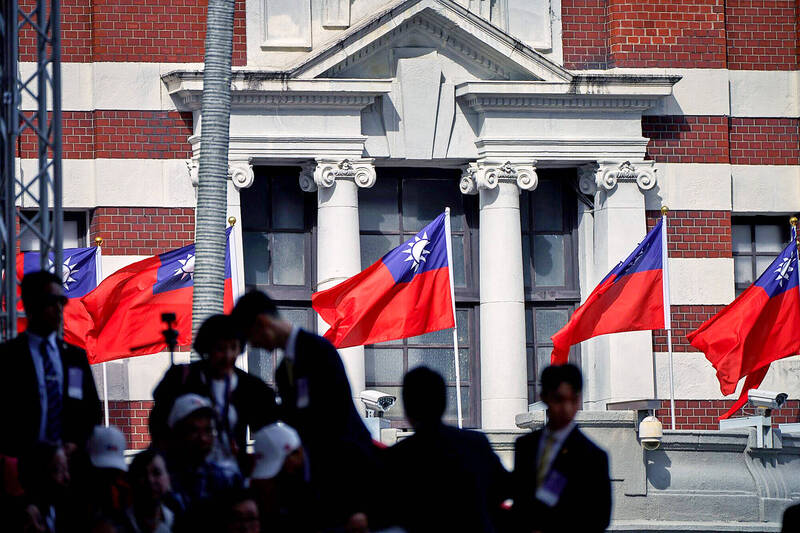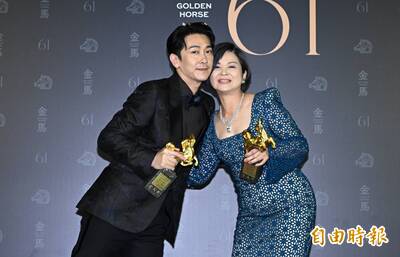《TAIPEI TIMES》 Lai shifting to strategic clarity: experts

Taiwanese flags fly during the Double Ten National Day celebration in Taipei on Thursday. Photo: An Rong Xu, Bloomberg
CLEAR MESSAGE:The president has signaled a move away from strategic ambiguity by voicing rejection of the so-called ‘1992 consensus’ and emphasizing Taiwan’s sovereignty
By Fang Wei-li and Jonathan Chin / Staff reporter, with staff writer
President William Lai (賴清德) is charting a course toward strategic clarity, experts in Taipei said, adding that unifying Taiwanese society has become his presidency’s greatest challenge.
They made the comment at a conference on Friday about the polarizing impact of great powers competition on Asia’s geopolitics cohosted by the Taipei School of Economics and Political Science Foundation, National Tsing Hua University’s Taipei School of Economics and Political Science, and Harvard’s Rajawali Foundation Institute for Asia.
Taiwan had been committed to a policy of ambiguity during the presidency of Ma Ying-jeou (馬英九), whose platform of putting economics before politics enjoyed overwhelming popularity, National Taiwan University political science professor Tung Han-pu (童涵浦) said.
The Ma administration’s signature policy was the “three nos” that renounced discussion of unification with Beijing, pursuit of de jure Taiwan independence and use of military force to resolve the Taiwan issue, he said.
By recognizing the so-called “1992 consensus” and avoiding diplomatic clashes with Beijing, Ma was able promote ambiguity and unification, he said, adding that the policy had worked at the time, because the US and China were not competing in earnest.
The “1992 consensus” — a term that former MAC chairman Su Chi (蘇起) in 2006 admitted making up in 2000 — refers to a tacit understanding between the Chinese Nationalist Party (KMT) and the Chinese Communist Party that both sides of the Taiwan Strait acknowledge that there is “one China,” with each side having its own interpretation of what “China” means.
Former president Tsai Ing-wen (蔡英文) enjoyed a similar level of popular support, but used her power to turn away from the “1992 consensus,” Tung said.
Tsai promoted the de facto autonomy of Taiwan, national security law amendments and developed military strength while avoiding overt displays in support of independence, he said.
The nation’s moderate pro-independence stance sharply contrasted with the increasingly strident regime of Chinese President Xi Jinping (習近平) even as US-China relations grew cold, he said.
Opinions can now be formed about Lai’s vision for the nation five months after his election and in the wake of his Double Ten National Day address on Thursday, Tung said.
Lai has voiced a clear rejection of the “1992 consensus” and emphasized sovereignty in a marked shift from Tsai’s stance on the nation’s relationship with China and its place in the world, he said.
Lai’s speech showed no interest in defining the difference between the Republic of China and Taiwan, and instead focused on the nation as a separate political entity from the People’s Republic of China, Tung said.
The clear and consistent messaging about the nation’s de facto independence signaled a break from the strategic ambiguity of the past, he said.
Although Lai’s creation of the Whole-of-Society Defense Resilience Committee could be seen as an affirmation of continuity with the Tsai administration, it could also be seen as an extension of the shift to strategic clarity, Tung said.
The polarization in Taiwanese society would likely become the biggest challenge to Lai, as embittered voters increasingly expressed a desire to emigrate or unwillingness to fight for the nation, Tung said, citing recent polls.
The whole-of-society resilience the government is so intent on facilitating hinges on cooperation across social divides, he said.
Polarization is affecting Taiwan and the global community, as nations coalesce into opposing camps led by the US and China, Academia Sinica Institute of Political Science researcher Wu Yu-shan (吳玉山) said.
Concurrent drives to enhance internal solidarity and outward-facing strength are the classic signs of polarizing geopolitics, Wu said, adding that proxy conflicts in the peripheries of great powers are a real danger to the world.
新聞來源:TAIPEI TIMES

















